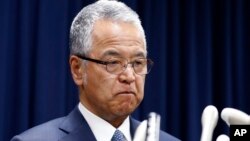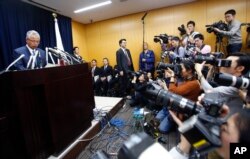Japanese Economy Minister Akira Amari resigned Thursday, fending off corruption allegations following a magazine report that he had accepted money in exchange for political favors.
At a packed news conference televised live, Amari acknowledged taking money from a construction company executive but said he told his aides to correctly record them as a political donation.
Amari — a chief architect of Prime Minister Shinzo Abe’s plan to revive the world's third-largest economy — denied wrongdoing but apologized for causing "concern and trouble" and undermining public trust in the government with a "very embarrassing situation."
Amari said he was stepping down to prevent the scandal from being a distraction to the administration's drive to pull the country out of deflation.
The corruption allegations surfaced last week after the magazine Weekly Bunshun reported that Amari and his aides accepted at least $103,000 in cash and hospitality from the unnamed construction company.
As economy minister since late 2012, Amari, who is 66, has been one of the most trusted members of Abe's Cabinet. He also served as Japan's top negotiator for the 12-nation Trans-Pacific Partnership trade pact.The government says former environment minister Nobuteru Ishihara will replace Amari.
With Amari's departure, Abe has lost a key ally as he prepares for an upper house election later this year.
According to The New York Times, Abe has used monetary easing by the Bank of Japan and other economic measures - a package known as Abenomics - to reverse the deflation and sluggish economic growth that have plagued the country for much of the past quarter century.











